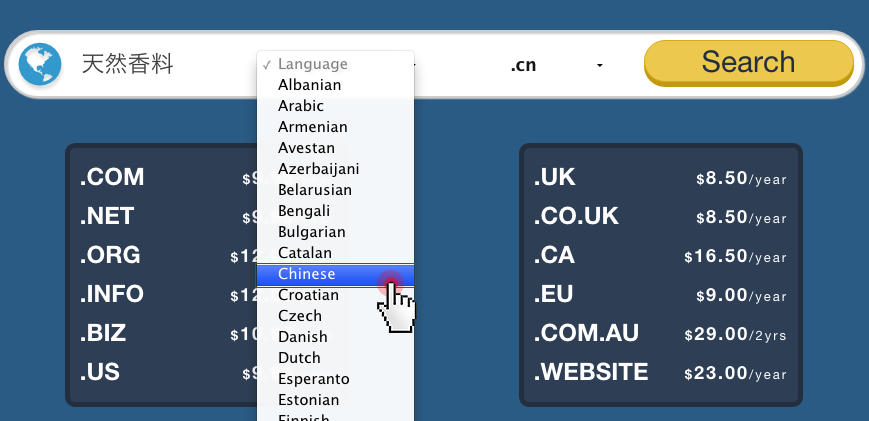IDN domain registrations now officially supported on our platform
 The Internet had long since become a global phenomenon. It was not until the introduction of multilingual domain names (IDNs) more than a decade ago, however, that its true value spread to every corner of the planet.
The Internet had long since become a global phenomenon. It was not until the introduction of multilingual domain names (IDNs) more than a decade ago, however, that its true value spread to every corner of the planet.
IDNs (Internationalized Domain Names) permit users from around the world to have a domain name in their native language and allow web addresses to contain non-Latin characters.
For you, IDNs are a great opportunity to target untapped local markets with a native domain name service.
What are IDN domain names?
IDNs allow web addresses to have characters from different scripts, beyond the traditional ASCII letters (a-z), the decimal digits (0-9) and the hyphen (-).
IDNs are divided into two groups:
1. IDNs at the second level
They were introduced in 2003, when a specification allowing the use of Unicode characters in domain names was released, so people were permitted to register web addresses in their native languages, for example:
großelösungen.de
2. IDNs at the top level
IDNs at the top-level, i.e. domain name extensions containing non-Latin characters such as مصر. (for Egypt) and .рф (for Russia), were enabled with the launch of the IDN ccTLD Fast Track Process in November 2009.
They were first made available to the governments and administrations of countries, which operate country-code Top-Level Domains and are listed in the ISO 3166-1 standard.

Why are IDNs valuable today?
As the Internet has gradually covered almost all parts of the world and has turned into a global treasure, the implementation of a way of using characters from all alphabets in web addresses has become a natural necessity.
Website owners need to create web addresses in their own language and alphabet because of the natural feel and the easier interpretation and memorization.
IDNs are also seen as a great facilitator of brand recognition and a great marketing tool for local audience-targeted businesses.
A few years after they were enabled, IDN domain names have become a must for every site owner who wants to build an online presence that speaks the language of visitors.
In fact, for best business results, marketers today recommend that ‘non-Latin’ site owners register two names for their domain – one in their native script:
großelösungen.de
and another one using the regular ASCII characters.
greatsolutions.de
This way, they will be able to target both local and global audiences. After all, as local as you want to be, the Internet still holds a great potential for you to spread your word globally.
How do IDNs work?
IDNs do not bring changes to the Domain Name System (DNS). Non-ASCII-compliant domain names are made ASCII-compliant in the backend by transforming non-ASCII Unicode characters into a special sequence of ASCII characters through the use of punycode.
This way, when a user types a non-Latin web address in their browser:
納豆.例.jp
the latter will convert the native script characters into their corresponding punycode equivalents:
xn--jp-cd2fp15c.xn--fsq.jp
For the IDNs to work, they need to be supported by both browsers and the platform where the non-ASCII web address is located.
On our web hosting platform, we have enabled full punycode support for backend Unicode-ASCII conversions.
In order for our punycode conversions to work, users’ browsers will need to support IDNs too. Currently, all recent versions of major browsers like Internet Explorer, Firefox, Netscape, Opera and Safari offer client-side support for IDNs. In Internet Explorer 6, IDN support can be enabled through the use of a special plug-in.
Which TLDs support IDNs?
Currently, Unicode characters are supported by popular TLDs like .COM, .NET, .ORG, .INFO, .WS, .CC, etc.
Other TLDs offer support for a selection of languages. For example, .CO supports Spanish, Danish, Norwegian, Japanese, Korean, Swedish, Icelandic, Finnish and Chinese, .EU offers support for almost all European languages, while .ASIA supports only Chinese, Japanese and Korean.
How to register IDN domains?
In the domain search form, fill in the name of your site and select your preferred language from the language drop-down menu:

Then proceed with the domain registration as usual.
***
Implementing official support for internationalized domain names on our reseller hosting platform is a great step towards making your web hosting services more useful and pleasing to local audiences.
IDNs are a great instrument for approaching your customers in their native language right from the start and for allowing your customers in turn to convey their message to their audiences in an easy-to-read-and-understand manner.
NOTE: For now, we only support IDNs at the second level. Soon, we’ll start supporting top-level IDNs, so you can round out the nativeness of yours and your customers’ web addresses.
Originally published Wednesday, September 9th, 2015 at 2:41 pm, updated July 8, 2024 and is filed under The Free Reseller Program, Domain Names.Tags: domain registration, Domain Names


Guys what about .gr domain? 😀